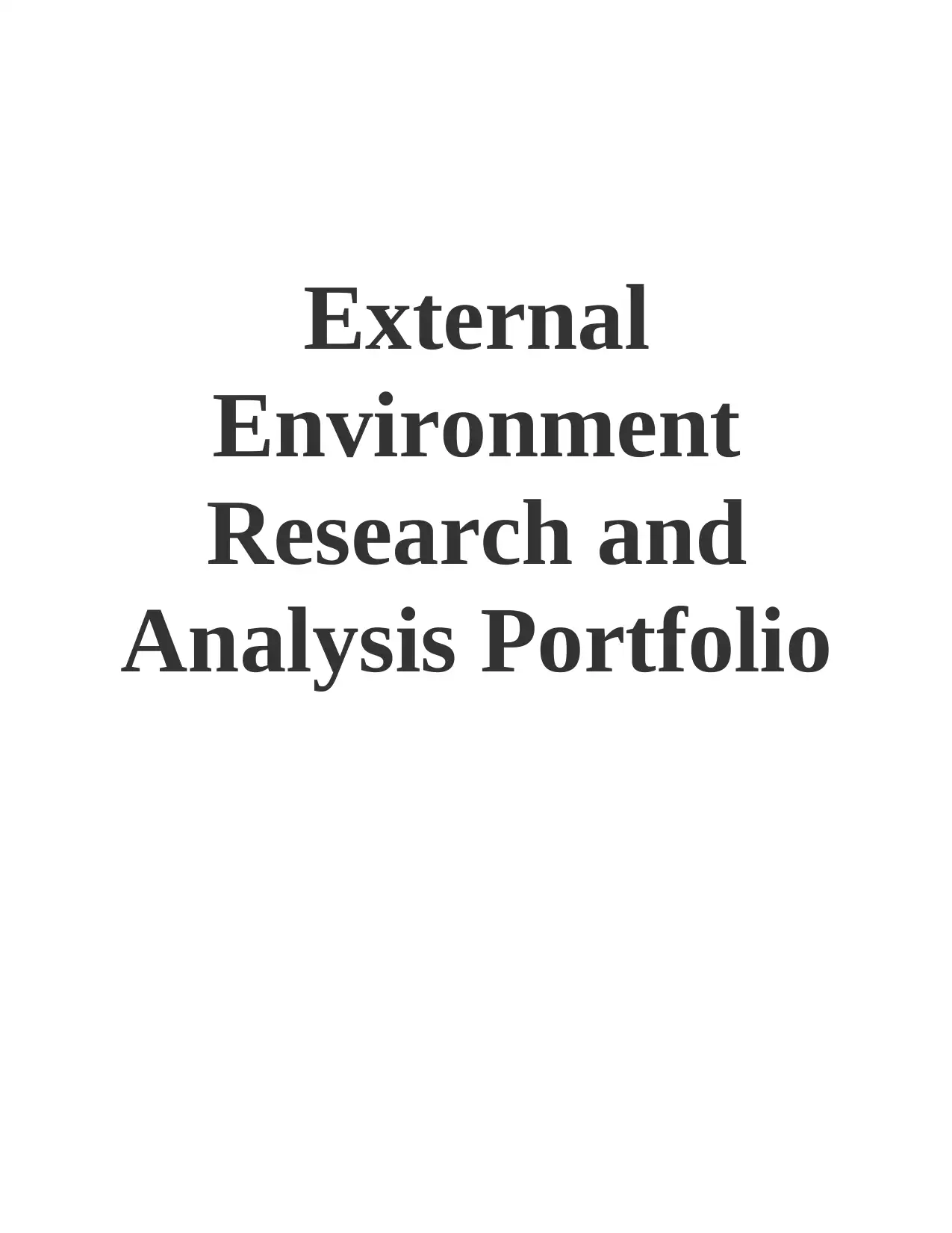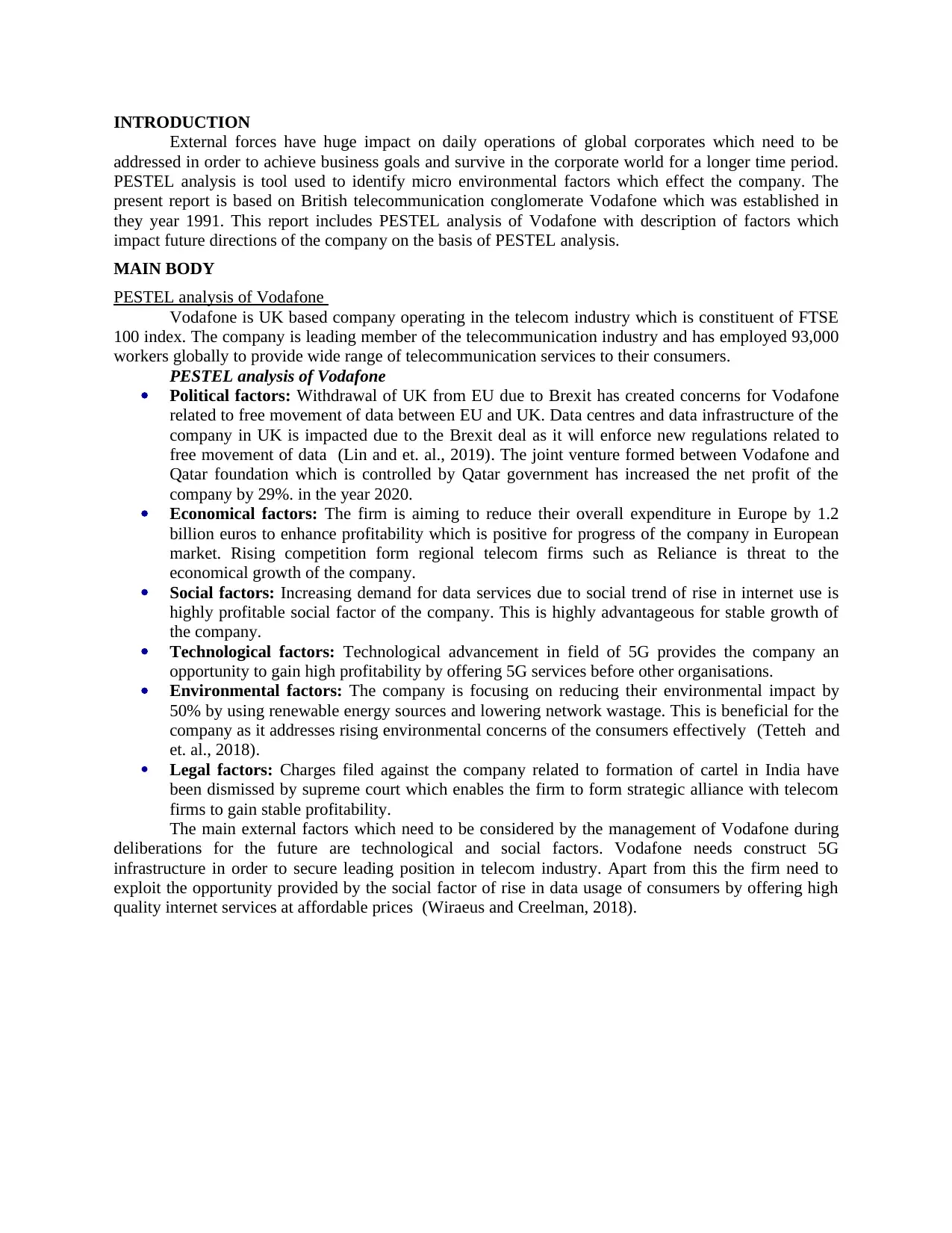External Environment Research and Analysis: Vodafone PESTEL Report
VerifiedAdded on 2022/12/26
|5
|706
|62
Report
AI Summary
This report presents a PESTEL analysis of Vodafone, examining the external factors influencing its business operations. The introduction highlights the importance of external forces and introduces the PESTEL framework. The main body provides a detailed analysis of political (Brexit, Qatar joint venture), economic (expenditure reduction, competition), social (data demand), technological (5G), environmental (renewable energy), and legal factors (cartel charges). The analysis emphasizes the impact of technological advancements and social trends on Vodafone's future. The conclusion stresses the importance of considering external factors for strategic decision-making and long-term survival. The report references relevant academic sources to support its findings.

External
Environment
Research and
Analysis Portfolio
Environment
Research and
Analysis Portfolio
Paraphrase This Document
Need a fresh take? Get an instant paraphrase of this document with our AI Paraphraser

Table of Contents
INTRODUCTION ......................................................................................................................................3
MAIN BODY .............................................................................................................................................3
PESTEL analysis of Vodafone ..............................................................................................................3
CONCLUSION ..........................................................................................................................................5
REFRENCES .............................................................................................................................................6
INTRODUCTION ......................................................................................................................................3
MAIN BODY .............................................................................................................................................3
PESTEL analysis of Vodafone ..............................................................................................................3
CONCLUSION ..........................................................................................................................................5
REFRENCES .............................................................................................................................................6

INTRODUCTION
External forces have huge impact on daily operations of global corporates which need to be
addressed in order to achieve business goals and survive in the corporate world for a longer time period.
PESTEL analysis is tool used to identify micro environmental factors which effect the company. The
present report is based on British telecommunication conglomerate Vodafone which was established in
they year 1991. This report includes PESTEL analysis of Vodafone with description of factors which
impact future directions of the company on the basis of PESTEL analysis.
MAIN BODY
PESTEL analysis of Vodafone
Vodafone is UK based company operating in the telecom industry which is constituent of FTSE
100 index. The company is leading member of the telecommunication industry and has employed 93,000
workers globally to provide wide range of telecommunication services to their consumers.
PESTEL analysis of Vodafone
Political factors: Withdrawal of UK from EU due to Brexit has created concerns for Vodafone
related to free movement of data between EU and UK. Data centres and data infrastructure of the
company in UK is impacted due to the Brexit deal as it will enforce new regulations related to
free movement of data (Lin and et. al., 2019). The joint venture formed between Vodafone and
Qatar foundation which is controlled by Qatar government has increased the net profit of the
company by 29%. in the year 2020.
Economical factors: The firm is aiming to reduce their overall expenditure in Europe by 1.2
billion euros to enhance profitability which is positive for progress of the company in European
market. Rising competition form regional telecom firms such as Reliance is threat to the
economical growth of the company.
Social factors: Increasing demand for data services due to social trend of rise in internet use is
highly profitable social factor of the company. This is highly advantageous for stable growth of
the company.
Technological factors: Technological advancement in field of 5G provides the company an
opportunity to gain high profitability by offering 5G services before other organisations.
Environmental factors: The company is focusing on reducing their environmental impact by
50% by using renewable energy sources and lowering network wastage. This is beneficial for the
company as it addresses rising environmental concerns of the consumers effectively (Tetteh and
et. al., 2018).
Legal factors: Charges filed against the company related to formation of cartel in India have
been dismissed by supreme court which enables the firm to form strategic alliance with telecom
firms to gain stable profitability.
The main external factors which need to be considered by the management of Vodafone during
deliberations for the future are technological and social factors. Vodafone needs construct 5G
infrastructure in order to secure leading position in telecom industry. Apart from this the firm need to
exploit the opportunity provided by the social factor of rise in data usage of consumers by offering high
quality internet services at affordable prices (Wiraeus and Creelman, 2018).
External forces have huge impact on daily operations of global corporates which need to be
addressed in order to achieve business goals and survive in the corporate world for a longer time period.
PESTEL analysis is tool used to identify micro environmental factors which effect the company. The
present report is based on British telecommunication conglomerate Vodafone which was established in
they year 1991. This report includes PESTEL analysis of Vodafone with description of factors which
impact future directions of the company on the basis of PESTEL analysis.
MAIN BODY
PESTEL analysis of Vodafone
Vodafone is UK based company operating in the telecom industry which is constituent of FTSE
100 index. The company is leading member of the telecommunication industry and has employed 93,000
workers globally to provide wide range of telecommunication services to their consumers.
PESTEL analysis of Vodafone
Political factors: Withdrawal of UK from EU due to Brexit has created concerns for Vodafone
related to free movement of data between EU and UK. Data centres and data infrastructure of the
company in UK is impacted due to the Brexit deal as it will enforce new regulations related to
free movement of data (Lin and et. al., 2019). The joint venture formed between Vodafone and
Qatar foundation which is controlled by Qatar government has increased the net profit of the
company by 29%. in the year 2020.
Economical factors: The firm is aiming to reduce their overall expenditure in Europe by 1.2
billion euros to enhance profitability which is positive for progress of the company in European
market. Rising competition form regional telecom firms such as Reliance is threat to the
economical growth of the company.
Social factors: Increasing demand for data services due to social trend of rise in internet use is
highly profitable social factor of the company. This is highly advantageous for stable growth of
the company.
Technological factors: Technological advancement in field of 5G provides the company an
opportunity to gain high profitability by offering 5G services before other organisations.
Environmental factors: The company is focusing on reducing their environmental impact by
50% by using renewable energy sources and lowering network wastage. This is beneficial for the
company as it addresses rising environmental concerns of the consumers effectively (Tetteh and
et. al., 2018).
Legal factors: Charges filed against the company related to formation of cartel in India have
been dismissed by supreme court which enables the firm to form strategic alliance with telecom
firms to gain stable profitability.
The main external factors which need to be considered by the management of Vodafone during
deliberations for the future are technological and social factors. Vodafone needs construct 5G
infrastructure in order to secure leading position in telecom industry. Apart from this the firm need to
exploit the opportunity provided by the social factor of rise in data usage of consumers by offering high
quality internet services at affordable prices (Wiraeus and Creelman, 2018).
⊘ This is a preview!⊘
Do you want full access?
Subscribe today to unlock all pages.

Trusted by 1+ million students worldwide

CONCLUSION
From the above report it is concluded that in order to survive in their industry for a longer time
period the organisation need to consider various external factors which impact their company during
decision making process. This will help the company exploit opportunities provided by external factors
and eliminate growth barriers which occur as a result of macro environmental forces.
From the above report it is concluded that in order to survive in their industry for a longer time
period the organisation need to consider various external factors which impact their company during
decision making process. This will help the company exploit opportunities provided by external factors
and eliminate growth barriers which occur as a result of macro environmental forces.
Paraphrase This Document
Need a fresh take? Get an instant paraphrase of this document with our AI Paraphraser

REFRENCES
Books and Journals
Lin and et. al., 2019. PESTEL Analysis of Smart Tourism Public Service Informatization in
Chengdu. Journal of Hebei Tourism Vocational College, p.03.
Tetteh and et. al., 2018. Why Invest in ICTs for agriculture?. CTA.
Wiraeus, D. and Creelman, J., 2018. Agile strategy management in the digital age: How dynamic
balanced scorecards transform decision making, speed and effectiveness. Springer.
Books and Journals
Lin and et. al., 2019. PESTEL Analysis of Smart Tourism Public Service Informatization in
Chengdu. Journal of Hebei Tourism Vocational College, p.03.
Tetteh and et. al., 2018. Why Invest in ICTs for agriculture?. CTA.
Wiraeus, D. and Creelman, J., 2018. Agile strategy management in the digital age: How dynamic
balanced scorecards transform decision making, speed and effectiveness. Springer.
1 out of 5
Related Documents
Your All-in-One AI-Powered Toolkit for Academic Success.
+13062052269
info@desklib.com
Available 24*7 on WhatsApp / Email
![[object Object]](/_next/static/media/star-bottom.7253800d.svg)
Unlock your academic potential
Copyright © 2020–2026 A2Z Services. All Rights Reserved. Developed and managed by ZUCOL.





